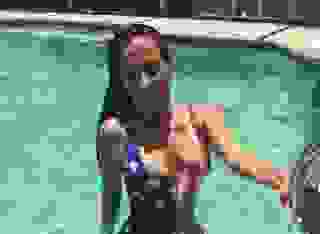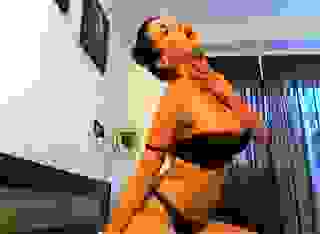Note: You can change font size, font face, and turn on dark mode by clicking the "A" icon tab in the Story Info Box.
You can temporarily switch back to a Classic Literotica® experience during our ongoing public Beta testing. Please consider leaving feedback on issues you experience or suggest improvements.
Click hereIt was four in the morning when I awoke, disoriented. I was in a hospital room. Karen Ann was home with the kids. My hand throbbed. They planned to operate on it in a few hours. I stared up at the ceiling. I remembered the bodies. I thought of Karen Ann's concern, her almost abrupt visits, her odd weeping. Something was going on. My mind leapt to conclusions which I discarded as silly.
Karen Ann called about 5:30 a.m. to say she would be there after the operation: she needed to get the kids to her parents and write lesson plans for school. She was sorry she couldn't be there before the operation.
My hand was repaired as well as it could be by Dr. Tara Beatol, who was the hand doctor for our part of the world. She operated at 7 a.m., her first of the day. My grip would probably never recover good strength, but I would have one. All my fingers would work, and I would feel and could even lift as long as that grip threshold was not reached. I could throw a ball, but my release might be difficult or make me wild. My jar-opening days were likely ended. People would notice a weak handshake. I was just a little crippled, and it would not be obvious.
She worked on my hand for five hours, a long time for a hand, I think. I was put into one of those euphoric "almost awake" states that regular people call sleep. After the operation, I imagined seeing Karen Ann by my side, and she was, but so was a scruffy guy who looked like he needed sleep.
I was foggy for a while, so the guy stayed in the background until I asked who he was.
Karen Ann said, "I don't really know. He has a badge."
He stepped forward. "Mr. Buck, I'm Special Agent Remarque. I'm with Homeland Security." He paused, letting me think about that.
"Mrs. Buck, you should hear this. After yesterday, we believe that you and your family may be in some danger of retaliation by the Islamic World Caliphate, the group that attacked the hospital." Karen Ann's eyes showed surprise.
"Why us? " she asked.
"Because of your husband's actions yesterday," Remarque said, looking at her as if she were not quite lucid.
"For shooting himself in the hand?" she asked, incredulous, laughing. It sounded like sniggering to me. The agent looked from her to me, and he saw the expressions on our faces. I shook my head the tiniest bit. The agent saw it and looked at Karen Ann.
She concealed what confidence she had in me, which I now realized was very little. Her disdain was practically adolescent. I thought she appeared... arrogant. Of all her quirks, of all her attributes, I'd never recognized arrogance in her.
Remarque, seeing the marital dynamic and probably wondering at it, decided not to volunteer details. He was a professional at walking into situations with incomplete knowledge. "No, just for being involved at all. We think we can contain the story to some degree, which should afford everyone involved some protection, the guards, the hostages, the witnesses, and," he hesitated just a split second to peek at me, "the guy who killed the terrorists. We've confiscated the videos from the two surveillance cameras in the cafeteria, and the ones in the hall don't show much. There's a cell phone video playing on Youtube from one of the people in the cafeteria, and it shows the takedown, but you can't see who it was; it's just too fuzzy and the light was not great, the voice is unclear," he said. "Mr. Buck, we'd like your cooperation in keeping everyone's name quiet."
Perhaps Karen Ann assumed I was a witness. I'd given her that impression.
I hesitated to think; I knew the guards, Jody, the Spagnols. "That should be no problem for me. The guards?"
"They want to keep it quiet. We're also keeping their names out of the news, the two hostages, also. Everyone knows what happened, but not who did what. We'd like everyone to keep the names out of the story. The guards'll just say it was someone they didn't know. A visitor, probably. Hopefully, everyone will be protected. No one should give anyone's name."
"You saw what happened?" Karen Ann asked me, surprised I'd been that close, I guess. In the whole affair, that was as close as she came to being impressed with me, or respectful. Perhaps it was my fault for not being up front about it.
"Yeah, I saw it; you could say that. Then I shot my hand and I got real nauseous and the police were everywhere," I said.
I'd not realized her loss of regard. I trusted Karen Ann with everything, EVERYTHING. Even though I joked about my foibles and actions, I thought she had a higher opinion of me. It's a part of the marriage commitment: to love and honor. What does honoring your spouse mean? Didn't she see humility as a virtue? She likely did, in theory. She simply didn't recognize humility in me. Humility required a level of competence she didn't consider mine.
I was disappointed in her. I wondered what had happened to us, and when. How.
"I'll be back in a bit, Mr. Buck," Special Agent Remarque said, "and we'll need to get into some greater detail."
"Anytime, sir, I'll be here all day today and tomorrow until noon. At least, it's what the doc said. After that, I'll be home a few days. You must have my address?"
He nodded and left. Karen Ann put her head on my shoulder, awkward though that was.
"Glad you're okay," she said.
"Me, too," I said.
"Did you see who killed them?" she asked.
"I didn't see much of him," I said, considering that truthful if misleading. "I'll not tell anyone anything."
I resolved to make an effort to talk more with her, to ask her opinions, to give mine and accept disagreement. I wanted to diminish the strange distance between us. I wanted Karen Ann to love me as much as I loved her. My good arm was around her, her head was on my chest, and I kissed her hair.
Chapter 4: Arrogance and Disloyalty
For some time, the arrogance of some of the best doctors at our hospital had rankled me. One surgeon made a small mistake during a liver transplant by accidentally slicing a drain tube, and had to replace it for the operation to continue. The mistake was no big deal; the operation went without a hitch, really, and the patient was doing well, but I watched as he called the family together to give them the (legal) rundown on the procedure. Still in his scrubs, straight from the operating room, he went over and poured himself some burned bad coffee from the pot in the waiting room, then sat down with the family, leaning back like one of the guys. I noticed he held the cup of coffee to his lips occasionally but did not really sip any. At the end of describing the successful operation, he said, "Oh, one little thing..." And then he described the slight mistake, as the law required.
Cheek, I thought. He knew their only concern was the condition of their loved one. This guy sold an exhausting operation like a referee with a bad call or a car salesman with a slightly beat up but decent car. It would bother me. Legally doctors must admit their humanity, admit their mistakes, and most do, most of the time, but listen for them carefully. They're just people.
I came to a different conclusion as I had more experience with doctors. One of our doctors failed to save a woman with an aortic aneurysm, and he trashed the operating room, throwing trays of instruments and breaking a light, scaring the other doctor and the nurses around him. He was arrogant and angry and I reflectively thought: DAMN, I WOULD WANT HIM FIGHTING FOR ME, willing to do whatever it took to save my kid, or my wife, or my mom, and taking it personally if he couldn't. If he didn't believe the procedure should work at least this once, who would?
Arrogance was a small price to pay for knowledge, judgment, skill, and determination, all wrapped up in a human being. Personal characteristics aside, doctors dealt with us in our worst moments of life. Perhaps in order to inspire confidence, arrogance was projected as a form of confidence. It was not all of the doctors, but it was not rare. Some were more self-actualized, confident, joking and sincere, looking into a patient's eyes as if every word was significant and revealing, or into the face of a husband whose wife was in dire condition and who deserved one moment of understanding from the person most likely to help, if anyone could. Often arrogance was just arrogance, building up the confidence of doctor, patient and family when confidence was most needed.
Of course, that doesn't make them easy to like. I don't blame the arrogant, nor do I seek their company.
Shawn Dunston was an arrogant one. Many a nurse, many another doctor, had been openly chastized for a mistake or difference of opinion during the middle of an operation, even in the operating room with the patient laid open before them. "He just thinks he's God," I heard an exasperated nurse say once.
Likeability was beside the point, though. Dunston was a very good doctor, considered by one magazine (which rates doctors like football teams) the best cardiologist in this part of the country. He invented a procedure that vastly improved the likely survivability of heart transplant recipients and wrote a paper on procedures to help heart valve replacement. The hospital was proud that he was here. Since his paper was published 10 months before the shootings, he was requested for consultation or speaking engagements in hospitals around the country—Johns Hopkins, Mayo Clinic, Cleveland Clinic, UCLA. Why would a guy like that stay at a country hospital like Merciful Lord? Indeed, I had heard that the board expected him to resign at the end of his contract, once he decided whether he wanted to live in New York, Los Angeles, or any one of the other places that good doctors go to become richer and more famous.
He had a great future until he was shot through his heart walking into our cafeteria. He was relatively young, 40, and handsome, dark and tall, and probably played tennis well. He chose the wrong moment to get that coffee or sweet roll, and he took a 5.56 round in the front and out the back obliterating most of the muscle that beats, the same one he knew how to exchange for another.
I hardly knew him, but occasionally we'd pass in the hall. I'd met him at two parties over the three years I'd been here. He'd acknowledge my greetings with a wave of his hand and looking past me, pointing out my inconsequence to him. He was known to have attracted quite a bit of money in the form of donations, having founded and led the heart transplant team the last four years and gaining a reputation for helping some very sick people. Regional, largely rural hospitals rarely conducted heart transplants, rarely obtained the required licenses and certification: ours was one of those few. I admitted to telling people I knew him; sometimes, he was the only reason people in other places had heard of Our Merciful Lord Hospital or Sky Grey, Ohio.
*
I went home on Friday, two days after the shooting, but I was practically couch-ridden with my hand up in a contraption for a few days. I would sleep on the couch due to the strange contraption. I liked seeing the kids, Hanley still immobile and Dylan toddling about and trying to speak words. Karen Ann took them to her parents and occasionally mine, so they were taken care of and I wouldn't have to do anything, awkward as I was those days. She had a lot to do that weekend and with work Monday and Tuesday, since the last days of school with the students had been cancelled. She was on the phone in the other room a lot Saturday.
Anyway, I spent most of my time at home, figuring how to use a bathroom with a hand on a wheeled holder-upper, learning to use a remote control left-handed. I watched the news, saw the shadowy recording of my actions. Anyone who looked carefully could see that the shooter had shot his own hand. They heard the yell as I shot the second guy, and my statement standing over them was clear, the only clear thing on the whole recording, but it didn't sound like my voice. I doubted anyone could identify the voice as mine, perhaps Karen Ann or my dad. Dad might recognize how I carried myself. In any case, I was lauded anonymously on Fox, one guy calling me a hero and another on MSNBC an "unknown deliverer." I shook my head.
It did identify the shooter as a Marine. I expected to be identified, but was not.
Karen Ann was in and out Sunday, shopping for groceries and even visiting the mall for clothes for me: shirts I could get over my hugely bandaged hand and without buttons, etc. She went to Walmart around midnight to be sure the family had what it needed for a few days. I didn't see that there was need for such a rush.
The community was coming to grips with the tragedy. Funerals began on Saturday, and most were scheduled in the coming week. One notable one was Monday: Wills, the accountant, whom I counted a friend. I didn't go, unwilling to drive with so many painkillers in my system.
*
One of the dead terrorists had a brother, it later turned out. I imagined him begging his brother to accompany them, but his brother refusing him.
I visualized their parting. "It is not your mission. You are not trained. You have another destiny," perhaps his brother's last words to him as he left for Ohio, Youssef hugging him briefly with a hand behind his neck.
I imagined him on that day of the massacre, as my hand throbbed in the night, first getting the news that his brother was dead having killed so few despite the expectations. It was supposed to be glorious, backcountry Americans facing trained warriors. Youssef would not be the great martyr he'd promised to be.
Perhaps he mourned his brother's failure in the great moment of his life, shot in the head by an off-handed infidel. Youssef was gone now, so cheaply. Not a failure, but not what they had hoped. In a town just east of Indianapolis, facing east on his knees, he may have had tears streaming down his face at his loss.
*
Karen Ann still had school—the last two days of the teacher schedule were that Monday and Tuesday. I asked her, what do you do at school on the last days without students, and she said she had books to count, posters to take down, walls to clean, recommendations to write, grades to check, meetings to attend, you know. She was obviously tired, having gotten only five or six hours of rest after all her shopping and work yesterday. She kissed me goodbye Monday morning and left about 6:30, wearing blue jeans and a work shirt, saying she'd be home at the usual time. She took the kids to her mom's house, across town, where they could spend the day and I wouldn't have to care for them.
It was about 10:15 a.m. that Terry Marks called, asking for Karen Ann. As the teaching team leader, Terry had to verify that each teacher had entered an accurate grade and Karen Ann's grade for one student was not consonant with the average she'd earned for the quarter. This happened when a teacher decided a student deserved a higher grade than the average in the computer; never did teachers enter a final letter grade below the percentage indicated. She said she had a question about the grade Karen Ann wanted to give a kid.
"Uh, Karen Ann's not here. She should be there with you guys. She left here around the usual time," I said.
"Oh. I thought she stayed home to take care of you," Terry said. "Took a sick day."
"No, not here. If she's not there, I don't know where she is."
"It's probably my mistake," Terry said, as if something was dawning on her. I could hear an almost desperate quality in her voice, like she'd committed a faux pas of some sort. I didn't understand. "She's probably in another part of the building. I just haven't seen her up here, but all her stuff's in so there's no reason she'd need to be up here."
I thought about that a minute. "Well, I can't help you, Terry. I'll let her know you're looking for her when I see her."
"Thanks, John. Hope the hand feels better."
"Thanks. Bye." I hung up. Terry's mistake was calling on our landline, instead of Karen Ann's cell phone.
It was about 12:30 p.m. Karen Ann called to see how I was.
"John, how's home?" she said.
"Fine, Babe. How's school?"
"Oh, you know, so much to do to close up the room and things. Too many books, all have to be counted and stacked and discrepancies noted. It gets tiresome after five hours, working mostly alone in the room. I have a lot of stuff to pack this year."
"Why don't you pick me up and I'll keep you company?"
"Nah, I'm going to go out with some of the other teachers," she said, "get some lunch. You take it easy. I'll see you around 4:30. Okay?"
"Fine, Karen Ann, see you then. Love you," I said.
"Me too, John. Bye."
Me, too.
Father Michales called that afternoon. "John, this is Mike. I know what you did, John. I spoke to the security guards before the police even got them, but we're doing everything we can to contain it. It's probably best your name not be out there for the extremists."
"Thank you, sir. I hope to be back at work next week or so."
"Take your time and heal. Things won't be normal here for a while. It's pretty awful. There are lots of Homeland Security investigators around, lots of police from various agencies, some in full battle dress." I could imagine him shaking his head.
"Okay, well, one of the investigators is supposed to come by tomorrow," I said. "My hand is pretty useless and the bulky wrap is tough to get around."
"I'll be in contact. I have funerals all week, insurance issues, but I should be able to contact you. Get better, come in and see me if I'm around, and we'll talk about some ideas I have. I'd like to change your job a little. Or a lot."
"Yes, sir. Thanks for calling."
So he was thinking about changing my job? Father knew what he was doing. He was purposely increasing my anxiety level, making me want to get back to work: to see if I had a job? That didn't sound like the administrator I'd known for three years. No, he wanted me eager to get to work for its sake. I wondered what ideas he had.
Karen Ann and the kids arrived about 5, Dylan running (with a huge wet diaper between his legs) to me, and Hanley in her arms.
"Tonight, I just want to take it easy and watch you play with the kids," she said, smiling.
"I'll second that. I don't have to use that contraption anymore, thank you Dr. Beatol," I said. She'd said just through Sunday, so I'd slept in my own bed next to Karen Ann. We ordered pizza, and sat around watching TV, getting Hanley to smile, and rolling a ball with Dylan, or rolling Dylan like a ball, pealing laughter. After feeding Hanley, we put both kids in their beds and the evening was calm.
We sat on the couch and kissed a bit, and I reached for her breast. She laughed and said, "You'll get wet, be careful!"
"Do you think she left any for me?" I asked, opening her feeding bra, the unsexiest female undergarment ever invented.
"Why don't you try?"
Breast milk was sweet, but I already knew that.
*
Tuesday morning came soon, and the memory of our first lovemaking in many months lingered. I have always loved waking with the memory of sex the night before. In this case, with the birth of Hanley just nine weeks before, Karen Ann refusing to use all the maternity leave near the end of the school year, and then the shooting, life had not been conducive to romance. Last night had been wonderful if a little sticky, but very refreshing for my confidence.
Karen Ann was up and dressing again for school, this time in a nice pants outfit. I watched her. She finished, saw me watching her in the mirror, and then came over. She sat beside me, put her arm across me, leaned down and kissed me softly. "I have to go now. The kids will be with Mom and Dad, you don't need to worry about them." She said it all very softly. She leaned in and kissed me again, stood, and turned. At the door she looked back and said, "Good-bye, John."








